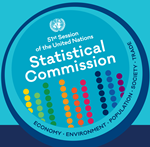Global Policy Watch
Published on Tue, 2020-04-28 22:21
WHO ACT Accelerator
On 24 April, the World Health Organization announced a multi-stakeholder initiative called the “Access to COVID-19 Tools Accelerator, or the ACT Accelerator”. The ACT Accelerator describes itself as “a collaboration to accelerate the development, production and equitable global access to new COVID-19 essential health technologies”. It is “grounded in a vision of a planet protected from human suffering and the devastating social and economic consequences of COVID-19”.
|
Published on Wed, 2020-04-22 16:31
The Financial Accountability, Transparency and Integrity (FACTI) Panel, a joint General Assembly and ECOSOC initiative established in early 2020, will hold a virtual consultation with Member States on 24 April. The Panel has made available an overview of existing mechanisms and a concept note of their work. Among their priorities will be addressing financial secrecy.
|
Published on Tue, 2020-04-21 14:46
The global impact of the COVID-19 crisis and the responses have raised a wide range of human rights concerns.
UN human rights experts and the UN High Commissioner have spoken out, collectively and individually, issuing statements covering the full range of civic, political, economic and cultural rights.
|
Published on Mon, 2020-04-20 15:50
The UN General Assembly (UNGA) Member States have adopted by consensus a Resolution (A/RES/74/270) on COVID-19 that calls for “international cooperation” and “multilateralism”. The resolution recognizes the "unprecedented effects of the pandemic, including the severe disruption to societies and economies, as well as to global travel and commerce, and the devastating impact on the livelihood of people". It calls for "intensified international cooperation to contain, mitigate and defeat the pandemic, including by exchanging information, scientific knowledge and best practices”. It stresses "the need for full respect for human rights" and states that "there is no place for any form of discrimination, racism and xenophobia in the response to the pandemic".
|
Published on Mon, 2020-04-13 14:19
At a briefing on COVID-19, Secretary-General Antonio Guterres stated: “We are in an unprecedented situation and the normal rules no longer apply. We cannot resort to the usual tools in such unusual times.”
The Secretary-General’s call for a global ceasefire in light of COVID-19 has already garnered significant support including from Member States and CSOs, receiving over 2 million signatures. Learn more and sign the petition here.
|
Published on Sun, 2020-04-05 12:20
The potential and challenges of the digital economy are emerging steadily on the UN agenda. The UN General Assembly’s Committee on Social, Humanitarian, and Cultural Issues (Third Committee) closed its 74th session in November 2019 adopting over 60 resolutions on a wide range of subjects, only one of which (A/C.3/74/L.11) addressed digital technologies.
The Committee heard presentations from a variety of Independent Experts and Special Rapporteurs, two of whom addressed in their reports the human rights implications of emerging digital technologies. The Special Rapporteur on Extreme Poverty and Human Rights, Phillip Alston, focused his report on the digital welfare state. The Special Rapporteur on the Protection of the Right to Freedom of Expression, David Kaye, addressed online hate speech.
|
Published on Mon, 2020-03-30 14:36
In addition to the health aspects of the virus, the global coronavirus crisis also has financial, socio-economic and developmental consequences. For this reason, a large number of policy measures have been announced by governments and international organizations, on the one hand to contain the pandemic, on the other to mitigate the economic consequences.
These measures contain for example fiscal stimulus and aid packages of various shapes and sizes, intended to cushion the serious economic and social consequences of the coronavirus outbreak worldwide. The main target groups of planned loans and cash injections are the healthcare system, as well as larger banks and companies. However, some strategies are also aimed at small and medium-sized companies as well as groups of individuals, their savings, private pensions and other private assets.
|
Published on Sat, 2020-03-21 10:14
The Covid-19 pandemia is a global health crisis (with major financial and economic consequences) but international organizations, starting with the World Health Organization “are still insufficiently funded to respond quickly to the emergence of dangerous diseases - and to prevent them from spreading to global pandemics” argue Jens Martens and Bodo Ellmers, from Global Policy Forum in a briefing paper published last March 18. People in most Global South countries are likely to suffer its impact even more and therefore “in order to prevent the corona crisis from becoming a global development crisis, solidarity must not end at national borders.”
|
Published on Wed, 2020-02-19 14:12
How to capture and manage big data? This is a question that will confront the 51st session of the UN Statistical Commission in March 2020 as they review the official reports. The four-year process of finalizing the global indicator framework to measure the 169 targets of the SDGs is drawing to a conclusion with the acceptance by the IAEG-SDGs of 8 additional indicators, 14 replacement indicators, 8 revised indicators and 6 deleted indicators. The framework has gone to the Commission for approval in March and the focus of different players in the data and statistics community is shifting to the management and use of data to influence and shape development policy agendas.
|
SUSCRIBE TO OUR NEWSLETTER
Submit

|





